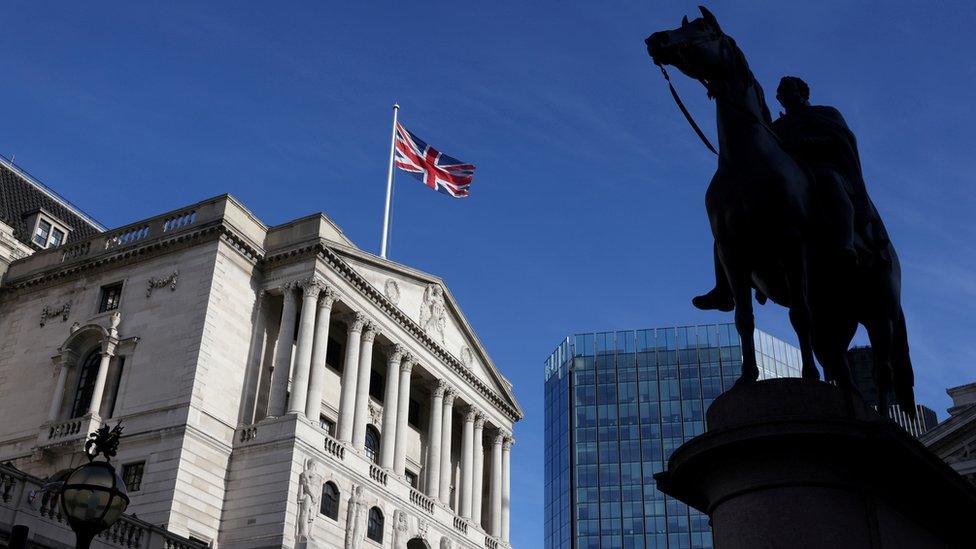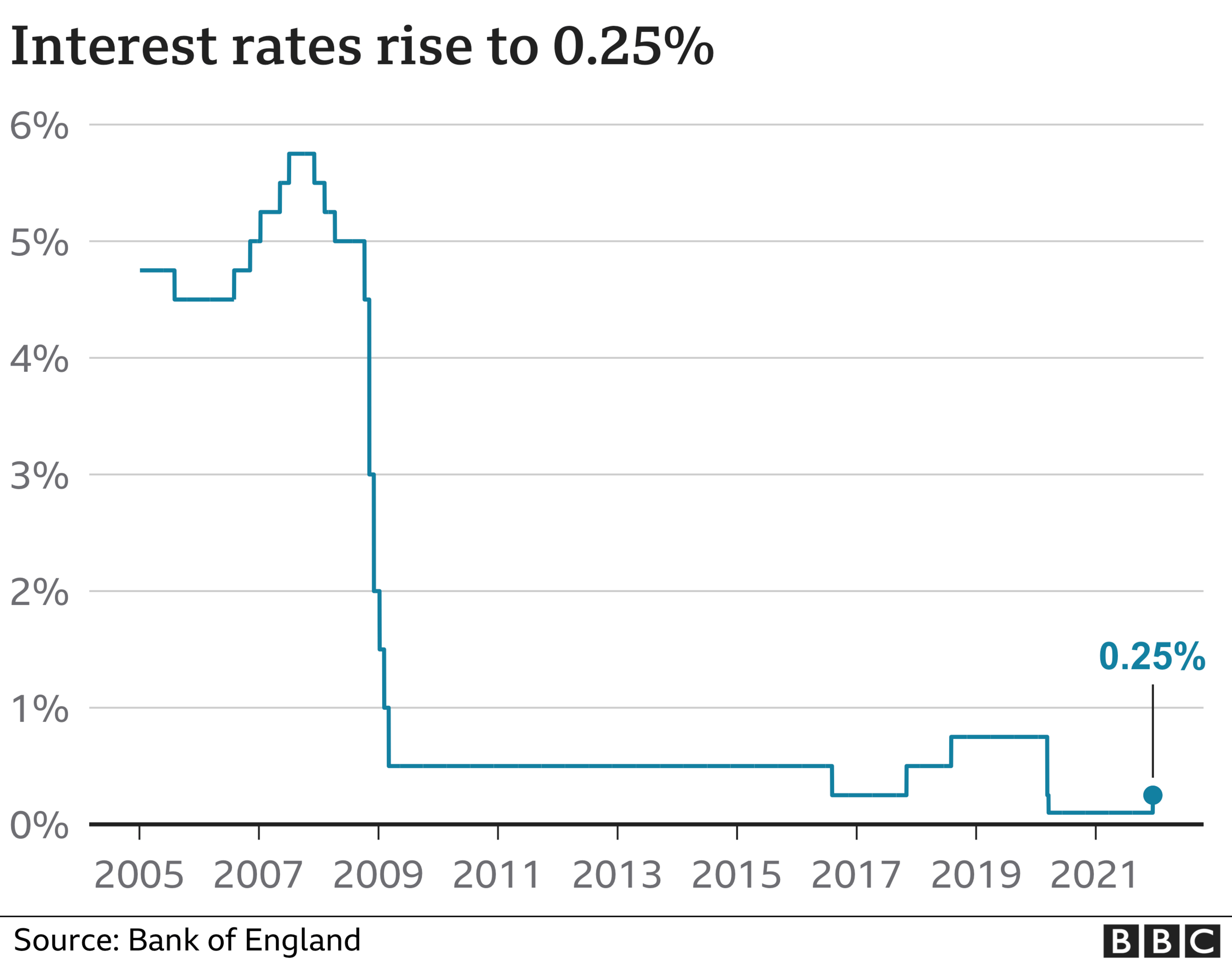Interest rates rise for first time in three years
- Published

The Bank of England has raised interest rates for the first time in more than three years, in response to calls to tackle surging price rises.
The increase to 0.25% from 0.1% followed data this week that showed prices climbing at the fastest pace for 10 years.
It came despite fears the Omicron variant could slow the economy by causing people to spend less.
The Bank's action is set to increase the mortgage costs of some homeowners.
Bank governor Andrew Bailey said it needed to tackle strong inflationary pressures building up in the economy.
Inflation is now running at 5.1%, the highest in a decade, and he expects it to rise further early next year.
"In the short term - that is, in the next two or three months - we think it can get to around 6%," he told the BBC.
A rise in wholesale gas prices is still a big factor driving inflation, and that is continuing to push up domestic energy bills.
But one business group said the interest rate rise would do little to stop prices going up, since costs were being pushed higher by global factors largely outside the Bank's control.

What does this mean for borrowers and savers?
The decision by the Bank of England will add just over £15 to the typical monthly repayment for a tracker mortgage customer.
A standard variable rate mortgage-holder is likely to pay nearly £10 extra a month.
Nearly two million people in the UK have one of these two types of mortgage.
While savers may welcome news of higher rates, analysts warn there is no guarantee the higher Bank rate will lead to better returns on savings.
Even if savings rates increase slightly, returns are still well below the rate of inflation.
Why is this happening now?

The Bank says inflation could hit 6% next year
The Bank can raise interest rates to help control price rises - but many experts had expected it to hold off because of uncertainty about Omicron.
Yet on Thursday, it said the prices of global assets, such as stocks and bonds, had largely recovered after an initial fall triggered by news of the new variant.
Successive waves of Covid also appeared to have had less impact on economic growth, the Bank added, although there was uncertainty around the extent to which that would prove to be the case this time.
"Consumer price inflation in advanced economies has risen by more than expected," the Bank said.
The Omicron variant could reduce economic activity early next year, said the Bank, although it was unclear how much of an effect it would have on inflation worldwide.
Mr Bailey told the BBC the Bank's rate-setters had thought "long and hard" about the impact of Omicron on economic activity before making their decision.
"But it is not at all clear if the impact [on the economy] could cause inflation to come down, or even go up," he said.

What is the Bank's strategy?

The Bank of England seems to like a surprise. Last month, acknowledging the expectation of an interest rate rise happening, it held off. This month, with the main development being the spread of Omicron, it has raised at a time when most expected it to hold.
It goes to show that the arguments have been finely balanced. The other development has been that inflation has hit even harder and even faster than expected. Six per cent is now the expected peak in the spring, which will represent the highest rate of inflation on the targeted CPI measure for 30 years. It is treble the Bank of England's target.
While it is important to note that a 0.15% rise is modest and still leaves base rates very close to historic lows, it is not ideal that this comes at the precise moment where some forms of consumer confidence, especially in terms of going out, appear to be slumping. The Bank's Monetary Policy Committee was briefed by the Chief Medical Officer, Chris Whitty, and intriguingly chose to mention the possibility that Omicron could raise inflationary pressure by further hobbling supply chains for goods, and the supply of workers.
The argument will be that it is better to nip expectations of inflation in the bud, than try to contain them once they get going. A rise now is preferable, in the eyes of the MPC, to having to rise by even more over the next year or two. The Bank is choosing to act on what it knows about inflation, rather than hold back on what it doesn't know about Omicron.

Was it a close call?
Not at all. The Bank's Monetary Policy Committee (MPC) voted 8-1 in favour of the increase. The dissenting MPC member, Silvana Tenreyro, voted to keep rates as they were.
Rates had been at 0.1%, a record low, since March last year, when they were cut in response to the effects of the coronavirus pandemic.
It was the second month in a row that Bank policymakers had surprised the markets.
Economists had expected a rate rise at the MPC's last meeting in November, but policymakers voted to hold fire.
This time, analysts expected a further delay because of Omicron, but the committee thought differently.
What do economists think?
"The Bank of England's decision to raise interest rates was surprising, given mounting uncertainty over the economic impact of the Omicron variant," said Suren Thiru, head of economics at the British Chambers of Commerce.
"While today's rate increase may have little effect on most firms, many will view this as the first step in a longer policy movement - not as a partial reversal of last year's cut."
He added that the current inflationary spike was mostly driven by global factors, so higher interest rates would do little to curb further increases in inflation.
Instead, the government needed to find practical solutions to the UK's supply chain problems and labour shortages, he said.
Paul Dales, chief UK economist at Capital Economics, said the move suggested that the Bank had become "a bit more hawkish" and might now think rates need to rise further than before.
"The MPC once again said that a 'modest tightening' of monetary policy is likely to be necessary, so this is not looking like a case of one and done," he added.
"We still think that weaker economic growth and a faster fall in inflation will mean that interest rates won't rise to 1% by the end of next year, but it's just become more likely that they rise above our 0.5% forecast."
The MPC also voted unanimously to maintain the Bank's asset purchase scheme at £875bn.
The last time the Bank raised interest rates was in August 2018, when they reached 0.75%.
They were then cut twice in March 2020 at the start of the pandemic.

Do you have a tracker mortgage and will now see your repayments rise? Are you worried that rising rates might affect your finances? Email haveyoursay@bbc.co.uk, external.
Please include a contact number if you are willing to speak to a BBC journalist. You can also get in touch in the following ways:
WhatsApp: +44 7756 165803
Tweet: @BBC_HaveYourSay, external
Please read our terms & conditions and privacy policy
If you are reading this page and can't see the form you will need to visit the mobile version of the BBC website to submit your question or comment or you can email us at HaveYourSay@bbc.co.uk, external. Please include your name, age and location with any submission.
Related topics
- Published15 December 2021

- Published17 March 2022


